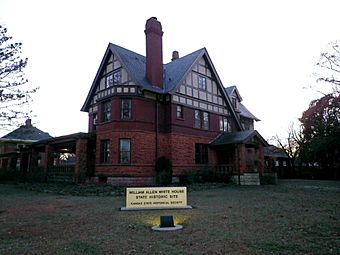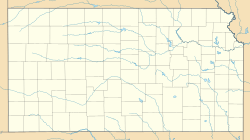Red Rocks State Historic Site facts for kids
|
William Allen White House
|
|

House in December 2009
|
|
| Location | 927 Exchange St., Emporia, Kansas |
|---|---|
| Area | less than one acre |
| Built | 1887 |
| Architect | Wight & Wight |
| Architectural style | Tudor Revival; Craftsman; Classical Revival |
| NRHP reference No. | 71000318 |
Quick facts for kids Significant dates |
|
| Added to NRHP | May 14, 1971 |
| Designated NHL | May 11, 1976 |
The Red Rocks State Historic Site is a special place in Emporia, Kansas. It protects the William Allen White House, also known as Red Rocks. This house was the home of a famous journalist named William Allen White. He lived there from 1899 until he passed away in 1944.
In 1976, the house was named a National Historic Landmark. This means it's a very important place in American history. In 2001, it became a state historic site. The Kansas Historical Society now takes care of it, so people can visit and learn about William Allen White.
Contents
About the Red Rocks House
Red Rocks is in a neighborhood in Emporia. The property has William Allen White's main house, his mother Mary's house, and a small building for visitors.
The Main House
The main house is two and a half stories tall. The first floor is made of red sandstone. The upper parts look like a style called Tudor Revival, with wood frames and stucco. It looks like something from an old storybook!
How the House Was Built
Construction of the main house started in 1887. A judge named Almerin Gillette began building it. He used stone from the Garden of the Gods area in Colorado. But he couldn't finish it because of money problems.
William Allen White and his wife Sallie bought the unfinished house in 1899. They finished the inside and made it their home. In 1920, a fire damaged the upper floors. Architects from Kansas City, Wight & Wight, helped rebuild it.
Mary White's House
William Allen White's mother, Mary, had her own house built on the property. It was built around 1903 or 1904. It's a two-and-a-half-story building made of brick and limestone. Mary lived there until she passed away in 1924.
The main house stayed in the White family for many years. In 2001, it was given to the state of Kansas.
Who Was William Allen White?
William Allen White became a very important person in the United States. He owned and edited a newspaper called the Emporia Gazette. Through his writing, he shared his ideas with many people.
He was a leader in the Progressive movement in the early 1900s. This movement aimed to fix problems in society and government. He helped organize the Bull Moose Party for Theodore Roosevelt in 1912. William Allen White was a strong voice for people living in small towns across America.
More to Explore
 | John T. Biggers |
 | Thomas Blackshear |
 | Mark Bradford |
 | Beverly Buchanan |



